Aftermath
Dictator Disposal
One day this week, inside a British rural corner shop, I overheard a conversation between two men.
“Has that ammo I ordered arrived?” He looked like a farmer. There was a tractor outside.
“Sorry. Nothing.” This man was wearing a camouflage patterned tee-shirt and military green trousers. He was standing by the till with a case of beer in his hands.
Groan from the farmer. “It’s been months.”
“Hunting rifle rounds aren’t priority these days. I heard all the factories have re-tooled to make NATO ammo and are knockin’ it out 24 hours a day.”
I went and sat in my car. It felt like that moment in a horror film when the thin and fragile facade that constitutes normality is decisively torn away. Remember in The Shining when Wendy (Sissy Spacek) looks at the novel her husband (Jack Nicolson) has been writing and finds only page after page of a single phrase? All work and no play makes Jack a dull boy. She knows then that she and their son, Danny, are in terrible danger. Suddenly, taking up the caretaker role in an isolated hotel in winter did not seem such a good idea, and the only possible escape is to destroy the madman, destroy the source of all the unfolding horror.
I turn on the radio and hear that Russian missiles have hit a holiday village near Odessa, killing 21 civilians, including children. Putin’s spokesperson has denied all responsibility and blamed the Ukrainians.
Iraq War 2003. I go to write about post-war reconstruction. The initial fighting phase is over.
Soldiers from the Black Watch regiment take me to tour the scene of their big victory, a motorway interchange outside Basra. It had happened days before, but all the burned-out tanks and vehicles are still there. A bad smell hangs in the hazy yellow air above a yellow featureless desert. Part of me wishes I’d witnessed the battle. The soldiers themselves are still buzzing with it. “I ran up that bank and fired at that armoured car – that one!” This soldier is young, only 19, and the memory of what happened is ripping through him with visceral intensity.
We go to where the Iraqi tanks were all destroyed and I climb up on one, a Russian-built T55. I peer down through the turret that has been torn off in the blast, but there is a loud shout from the top of the cutting. A British Army sergeant is waving and bellowing, “GET OFF. GET DOWN.” Behind him in a LandRover I can see an officer.
I jump down. The sergeant comes charging up. “No one climbs on these.”
“Why not?”
He hesitates. “I… I can’t tell you.”
“Bodies?”
He looks surprised at the suggestion. “No, not that. Contamination. Just don’t, right?”
He sets off back to the LandRover. I assume that ‘contamination’ means the tanks were destroyed by armour-piercing uranium-tipped shells. The wrecks are radioactive.
At Ba’ath Party headquarters, the building has been hit by a missile and has collapsed. The street is littered with live rounds of ammunition and the remnants of rocket-propelled grenades. At the hospital Dr Khalid has just dug a bullet out of someone’s chest. “Do you know Cheam in Surrey?” he asks. “I lived there once. It has a lovely park.” He’s called away to deal with the bloody aftermath of a land mine.
The whereabouts of Saddam himself are unknown. The biggest manhunt in history is underway. In Basra the British have taken over Saddam’s Palace and the press are assigned the ex-dictator’s bedroom to sleep in. Empty of furniture, it is a huge cool room with high ceilings and some fancy carved woodwork. I claim a ‘scratcher’, army slang for a camp bed. From the windows there is a good view of the Shatt al Arab river and the wreck of Saddam’s super yacht, the Mansour. The vessel is listing heavily and the superstructure has been badly damaged where an American cruise missile struck.
Exploring the grounds, I find there are actually four palaces surrounded by water gardens and I come across a gardener who was a gateman during Saddam’s reign. “The secret police all came here to dance and drink beer,” he tells me then points to another building. “If they took you there, you did not come out alive. Saddam was a devil, but his son Uday was crazy. If he saw a woman on the street that he wanted, he would have her picked up. If she refused, he would shoot her.”
Down in the Operations Room the military planners work under a carved ceiling that bears the words, in Arabic, “Saddam Huseein, the Faithful.” One young captain with a cut-glass accent gives me a quick summary of his mission. “We just want to get democracy started and then we can get out and let them build their nation.” Another young captain adds, “I’d like to come back in twenty years and see this place settled and prosperous.” He leaps to attention as the Lieutenant Colonel arrives. (I wonder if he will go. Next year, 2023, will be the twentieth anniversary.)
One morning I simply walk out past the guards on the gate. “See you later, guys. Don’t forget my face. I’ll be back later.”
In Basra town, without a soldier on my shoulder, I start to hear different tales: how the British tanks deliberately shot down the doors to the Central Bank and the National Museum and encouraged looters – Ali Babas. There is no way to know how true any of this is. I push through the souk, smiling at everyone, and determined not to feel threatened, but aware that my presence is causing some surprise. Fish are piled up next to mountains of cucumbers and radishes. Porters rush through with blocks of ice.
I meet an engineer called Furad and sit down with him at a tea stall. Have the British and Americans done the right thing to get rid of Saddam?
He laughs. “No! But now they must stay and stop us killing ourselves.” He taps his chest. “I am only forty years old but I have seen this place destroyed four times. In the Iran-Iraq war my father was killed and many more of my family too, but there are even more who simply went missing. People are looking for revenge. Other people are stealing whatever they can find. At night the killing is terrible. If we hear people coming, we shoot into the air to scare them away.”
We are accosted at our table by a bearded man who Furad seems to know. “I know where Saddam is,” he tells me. “He is in Florida. He was the American’s friend before the war.”
Another passer-by overhears this, and disputes it. “He is in Iraq, with plenty of money and protection.”
Yet another laughs scornfully. “He’s in Russia.”
At sunset the shadows are squeezed out from under the buildings, slowly at first, then quickening across the streets. No one here is optimistic. Life with Saddam was horrible, but without him chaotic violent forces are being released and no one has the least idea how to control them. The British army are doing a great job of setting up liaison committees and bustling about, but beneath this thin veneer lurks violent anarchy. There is only one thing worse than not getting rid of a dictator, you could say, and that is getting rid of one.
The restaurant nearby is selling roast chicken and the smell is enticing, but it is suddenly obscured by the smell of burning plastic. Curfew is coming. I return to the base before dark.
Next day I ask some soldiers from the boat squadron to take me out to Saddam’s yacht, the Mansour. When he bought this 121 metre-long ship in 1983, Saddam set a high bar for dictator shipping chic. There was a banqueting room for 200 guests, a crew of 60 and a helipad, plus sufficient cedarwood, mighty fountains and gold to keep a modern-day Kubla Khan content. When we reach it, I get hold of the twisted remnants of a ladder and climb up. The Cruise missile explosion and subsequent fire have destroyed almost everything, but there are many people aboard, all looting. I meet Rasul and Murtazar. They had been air-conditioning system engineers before the war, but are now desperate thieves. Rasul has found a set of cut-glass whisky tumblers that might fetch a few dollars. Murtazar has some scrap metal. They take me to see Saddam’s bathroom. Even through the destruction I can see how dated it all was. Below us in the engine room I can hear hammering, but I won’t go down: the entire ship is listing heavily. Rasul laughs and disappears down a ladder. “We need the money! There are no jobs now.”
At night in the palace, the sound of crickets is like static from the army radios. Unable to sleep in the heat, I get up and look out to see an owl sitting in a palm tree, watching.
In the morning the Mansour has gone. Almost. There is a short section of its side protruding from the water. At some point during the night it has rolled over and anyone inside will have drowned. On the river bank locals are standing around staring at what remains of the ship. No one has heard of two young men called Rasul and Murtazar. When I ask if anyone was aboard when it rolled, all I get are shrugs. After everything that has happened here, the sinking of a super yacht with a few looters aboard is not significant.
Saddam’s sons, Uday and Qusay, were killed in a firefight with American troops at a house in Mosul on July 22, 2003. Reports at the time said they were found with briefcases containing perfume, clean underwear and around $100m in cash. Saddam was captured by American forces in December of that same year, hiding in a hole in the ground. He was hanged in 2006. In the end, all three men had been betrayed by those around them. A $30m reward was paid out.


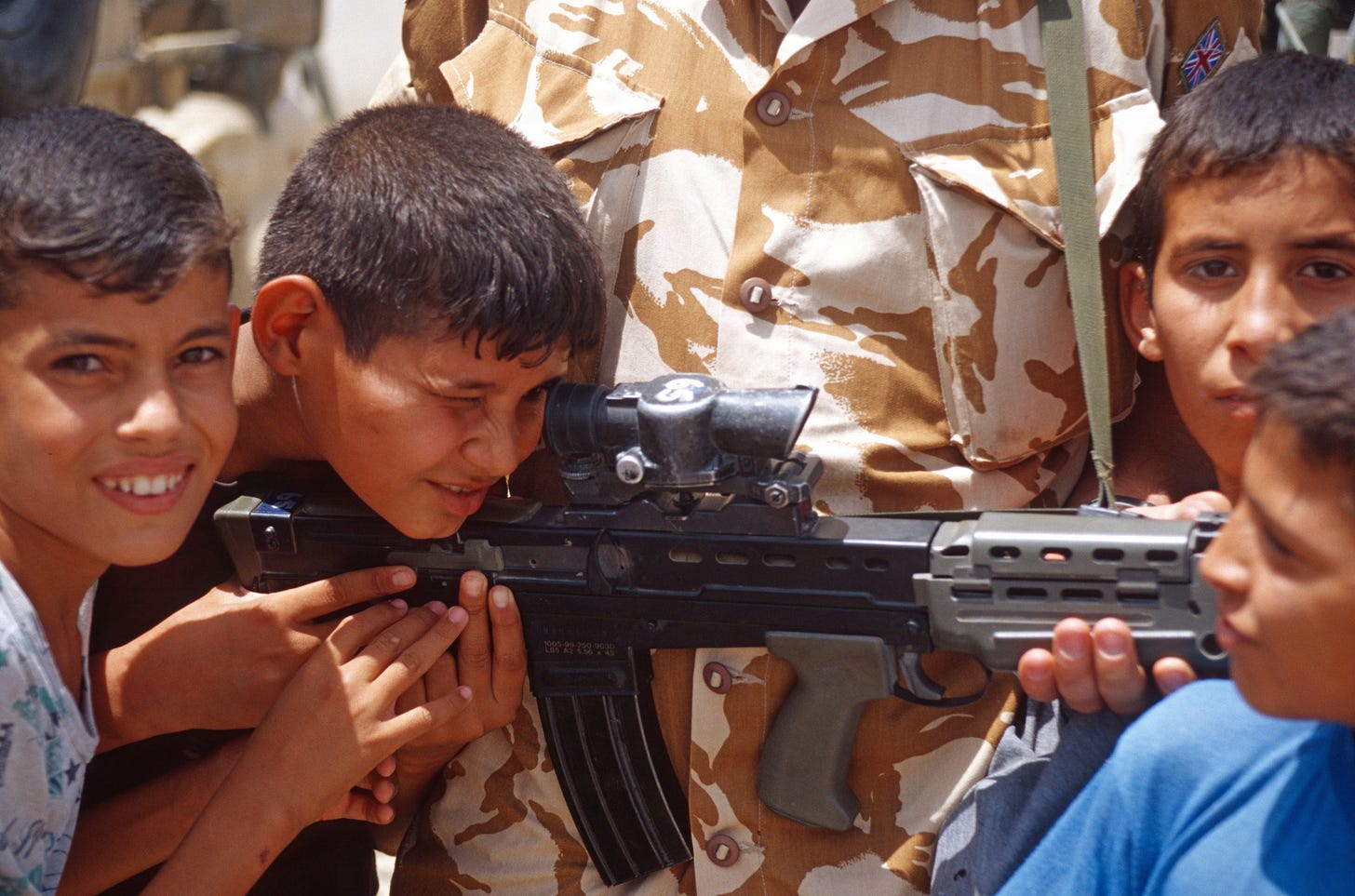
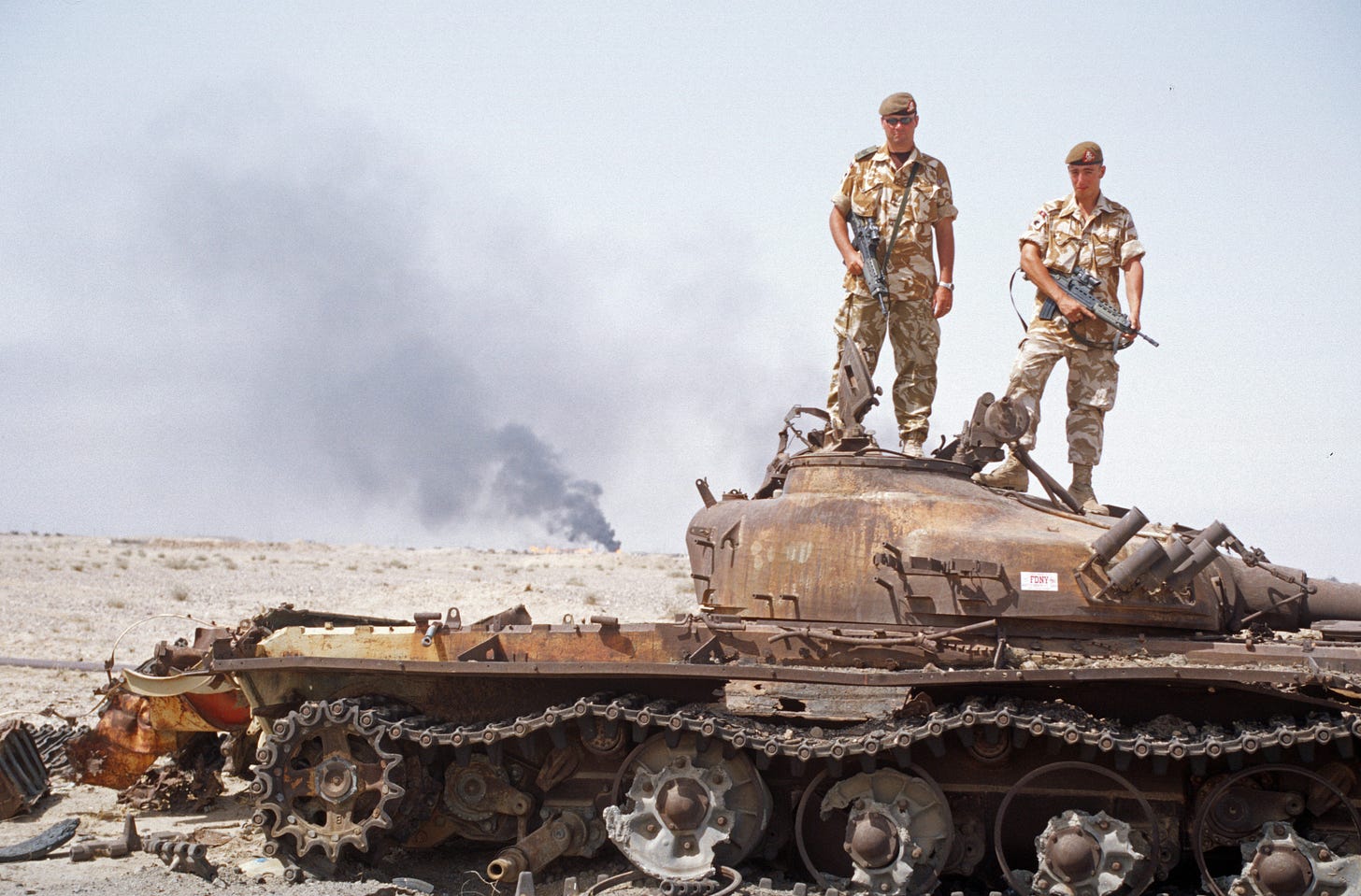
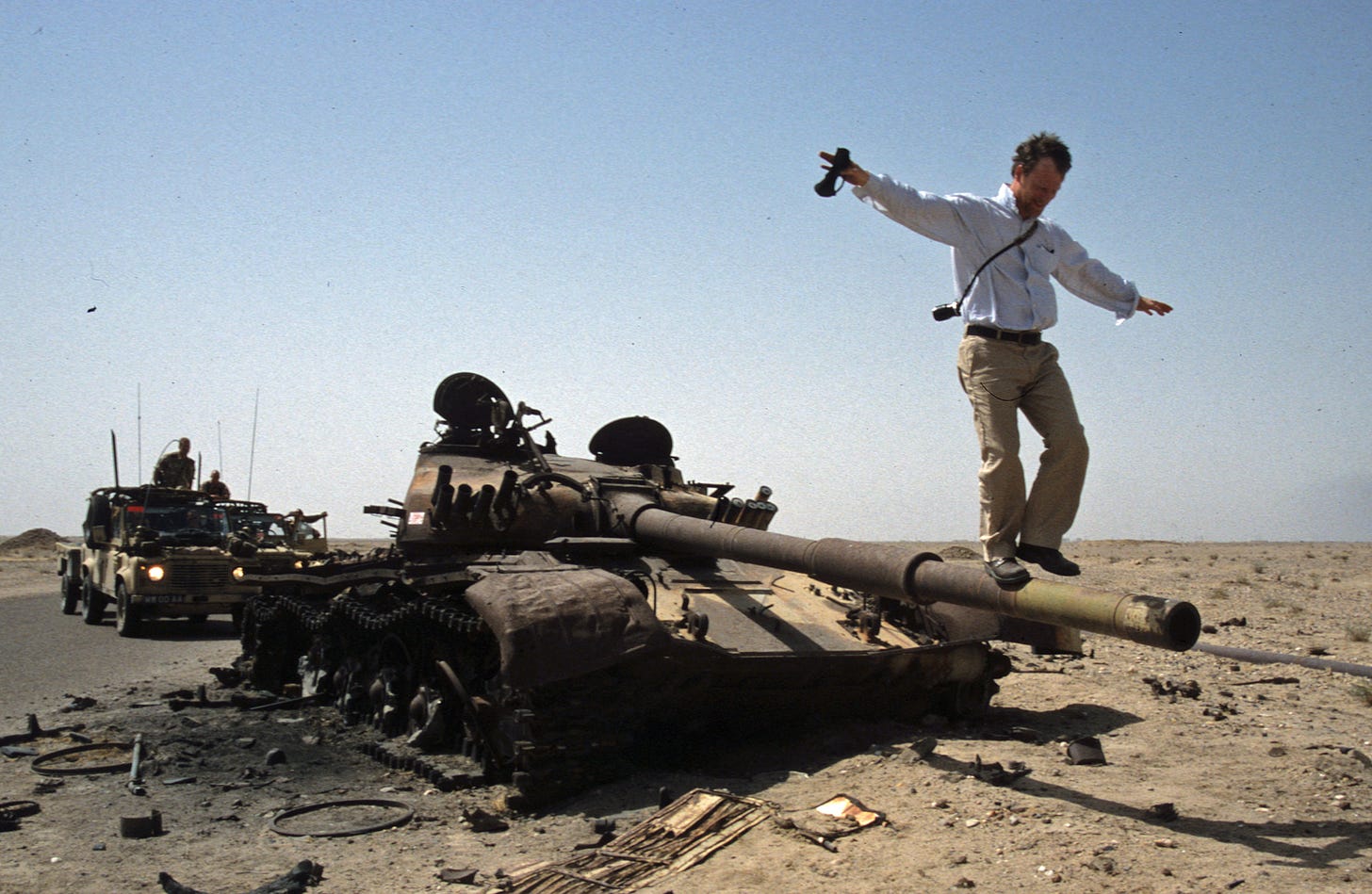
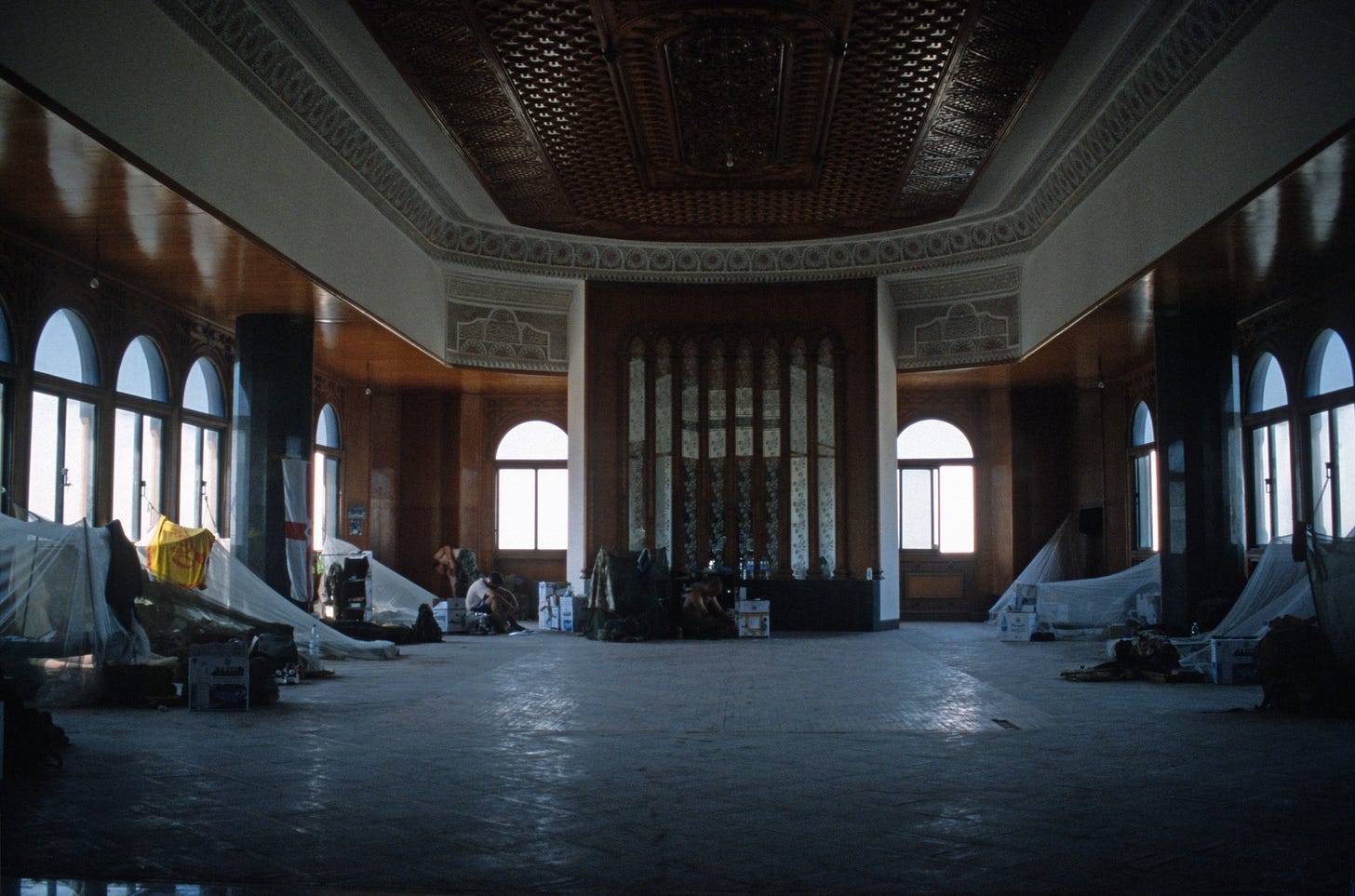
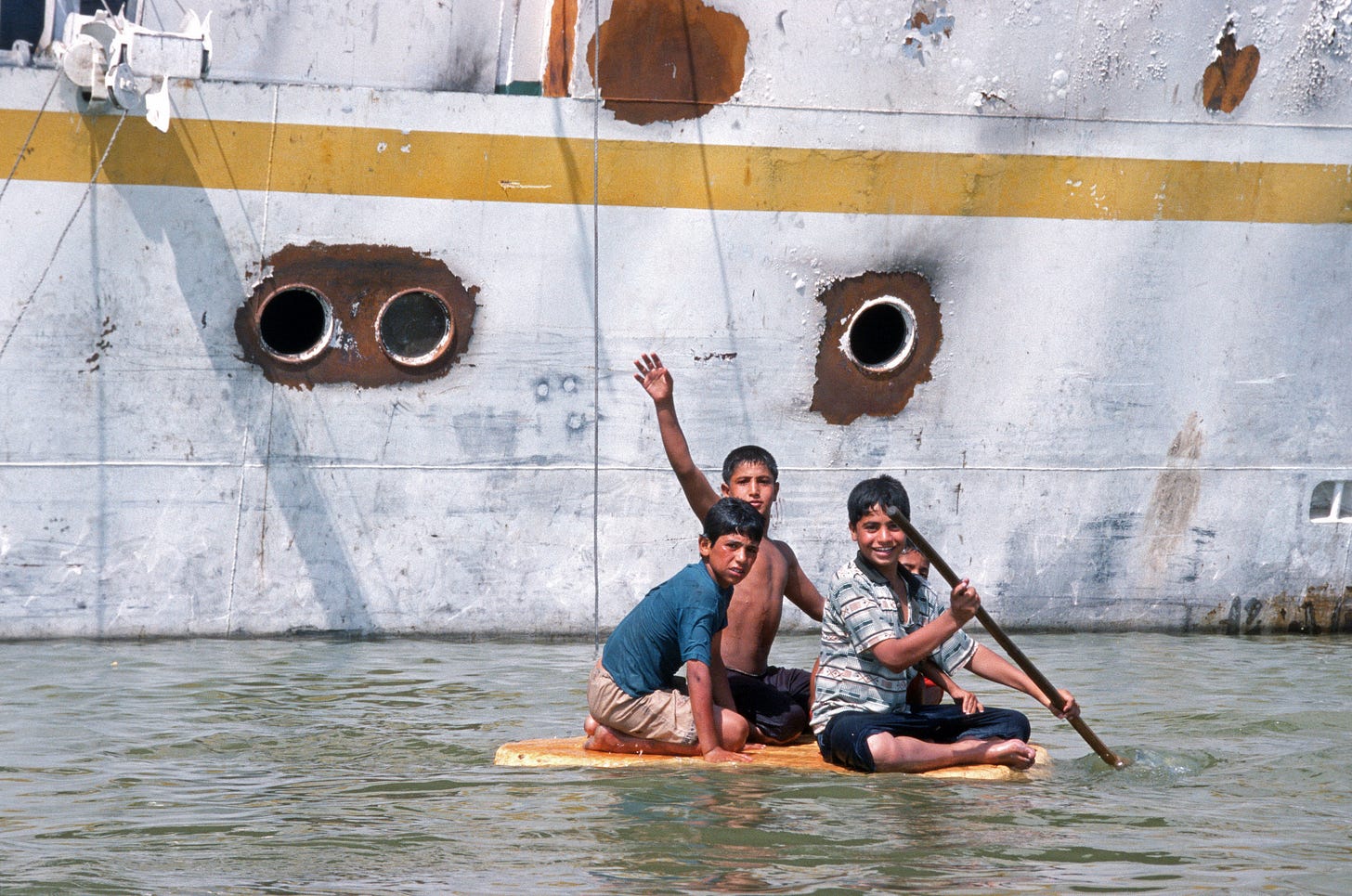
Fascinating account Kevin